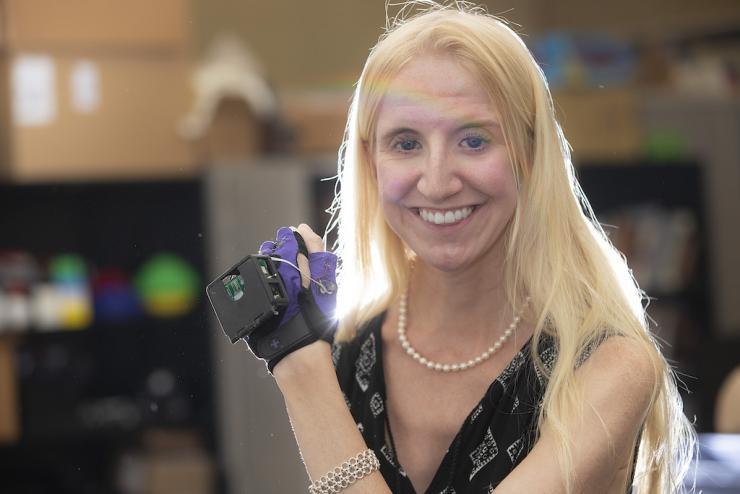Ph.D. Candidate Caitlyn Seim Earns Prestigious Neuroscience:Translate Grant From Stanford
Mar 02, 2019 — Atlanta, GA

School of Interactive Computing Ph.D. candidate Caitlyn Seim was awarded one of Stanford University’s exclusive Neuroscience:Translate grants. The grant is part of a new program to support translational neuroscience research to find practical solutions for unmet patient needs.
Seim earned the grant based on her research into passive haptic stimulation, which resulted in a glove that could be used to assist in stroke rehabilitation. Stroke is one of the leading causes of disability around the globe, impacting millions of survivors each year. Survivors often lose function in their arms or hands, making it difficult to perform everyday functions like dressing or eating. Spasticity and tone can also cause hands to be involuntarily clenched in a rigid position – a problem for which there are few effective treatments.
Survivors lack options when it comes to rehabilitation, and existing methods can be strenuous, costly, or painful. Building on previous work, Seim is using the funding to investigate a novel stimulation method using a wireless, wearable device that may provide therapy on the go and to patients who do not have access to high-intensity rehabilitation.
Seim started working on this research during her time at Georgia Tech with Professor Thad Starner. She’s now collaborating with Maarten Lansberg of the Stanford University Medical Center and Allison Okamura, professor of Mechanical Engineering at Stanford. Seim will join Stanford as a postdoctoral researcher this summer, where she will continue to work on this project.
Seim said that she and Starner are launching a company to put the device on the market – with the goal of translating research outcomes to clinical solutions. “If we can help, then it's all worth it,” Seim said.
To connect with Seim about this project, you can email her at ceseim@gatech.edu.




